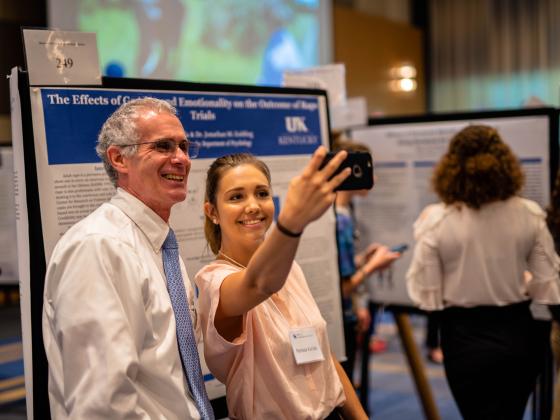Week 32: April 9, 2018 - April 13, 2018
Dr. Suzanne Smith - College of Engineering, Mechanical Engineering
With research interests that include aerospace, autonomy, robotics, and controls, mechanics and materials, and vibration and acoustics, Dr. Suzanne Smith has been a tremendous research mentor to over 50 undergraduate engineering students this past year. Dr. Smith is the Donald and Gertrude Lester Professor of Mechanical Engineering at UK, as well as the Director of the NASA Kentucky Space Grant and EPSCoR programs and the Director of UK Unmanned Systems Research Consortium.
Over the last year, there are several projects that have included undergraduate students in research: CLOUD-MAP, KRUPS, Eclipse Ballooning, and Eventing Sports Safety. This past year during the solar eclipse, Dr. Smith's team from UK launched two balloons from Russellville, KY in the path of totality, successfully live-streamed video to the NASA and YouTube websites, and employed redundancy designs to capture their "Kentucky Money Shot" image of another balloon at the edge of space during the eclipse. NASA's nationwide Eclipse Ballooning project included over 1,000 college students in 55 teams that live-streamed video from 77 balloons at the edge of space from Oregon to South Carolina along the path of the eclipse.
When asked about her job as a mentor, Smith replied, "I've involved undergraduate student researchers in my lab and on projects throughout all 28 years of my career at UK. These students make significant contributions to the research, and as a result, many publish or present their results, receive internship opportunities at NASA and other employers, and continue on to graduate study at UK and other universities." Dr. Smith appreciates undergraduate students' creativity that they bring with them to the projects, "they contribute unique solutions to research challenges. I see my role in their education as creating opportunities - combining their classroom and extra-curricular experiences to enable them to succeed and pursure their career goals."
When looking for mentees, Dr. Smith looks for a number of standout qualities when talking with students about undergraduate research. "Their interest and motivation for the problem is important, along with their abilities and needs of the project. Most of our projects are multi-disciplinary, so curiosity about everything including other disciplines than their major, is valuable." Dr. Smith also looks for students who have experience working on large teams, such as marching band, sports teams, or orchestra."
Dr. Smith believes that "the value of undergraduate research is that students learn that the edge of knowledge is closer than they realize, and consequently understand that they can make a unique contribution to advance everyone's understanding and benefit society."
Dr. Smith was nominated by one of her mentees, who told us:
"Dr. Smith gave me the opportunity to participate in undergraduate research as a freshman. Even though I have little experience and completed coursework towards my degree in mechanical engineering, she has been extremely encouraging, supportive, and patient with me. Her inclusiveness has given me invaluable experience very early on in my career and has motivated me to continue to pursue my degree!"
Thank you Dr. Suzanne Smith for your support and dedication to undergraduate research and your mentees. The Office of Undergraduate Research is pleased to recognize Dr. Suzanne Smith as this week’s Faculty Mentor of the Week
